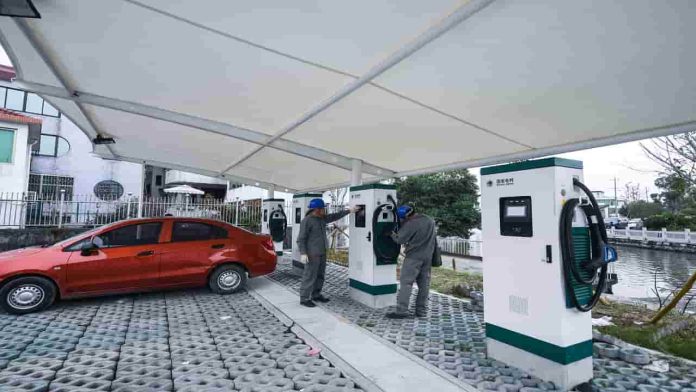With the expansion of the telecom sector and consumer economics driving the ecosystem, the number of cars run by aggregators and delivery service providers will only grow in the coming years. Considering this, the government of the National Capital Territory (NCT) of Delhi has proposed a scheme titled “Delhi Motor Vehicle Aggregator and Delivery Service Provider Scheme 2023” that facilitates and provides transport services for the movement of passengers and goods via a mobile application, website, or any other form of digital intermediary to connect with/by consumers. The Scheme aims to promote the use of electric vehicles (EVs) as a sustainable mode of transport.
The Motor Vehicle Aggregator Scheme 2023 establishes a new precedent in India, making Delhi the first state to compel the conversion of commercial vehicles from traditional fuels to electric power. This forward-thinking initiative reflects Delhi’s dedication to environmental sustainability and serves as a catalyst for other locations, hastening the country’s adoption of EVs.
The initiative proposes to license and regulate aggregators providing passenger transport services and delivery service providers providing goods and commodities in NCT. The scheme’s main goal is for aggregators and service providers to completely convert to EVs by 2030.
This sector provides much-needed employment for gig-economy employees while also ensuring the efficient delivery of products and services. However, it is critical that the movement of such vehicles be governed by a strong operational structure. In addition to protecting passenger safety and security, the current scheme will encourage aggregators and delivery service providers to use electric vehicles for their services.
Delhi Chief Minister Arvind Kejriwal has given the approval of the said scheme and reportedly stated: “With this groundbreaking scheme, we are placing the safety of passengers at the forefront and ensuring swift resolution of grievances. Simultaneously, we are driving the adoption of electric vehicles, heralding a new era of reduced pollution levels in our beloved city.”
In delving deeper into the Scheme’s rationale, he also explained how the transition to electric automobiles and promotion of electric bike taxis can efficiently address pollution in Delhi while also creating new job opportunities and fostering healthy economic growth.
The Motor Vehicle Aggregator Scheme 2023 will apply to all individuals or entities involved in the operation via digital or electronic platforms, or any other means. This is in order to facilitate passenger transport or enabling drivers to deliver or collect products, couriers, packages, or parcels from sellers, e-commerce entities, or consignors.
The Motor Vehicle Aggregator Scheme 2023 requires aggregators to put panic buttons in their vehicles and integrate them with the emergency number 112 (Delhi Police). These methods improve passenger security and allow for faster response time in the event of an emergency.
The Scheme follows the Polluter Pay Principle. Notably, conventional car license fees will be significantly higher than those for EVs. Furthermore, to encourage the use of EVs, the per-car license price for a conventional vehicle is substantially greater than that of an electric vehicle. For example, an electric taxi may have no license price, whereas a CNG taxi may have a license fee of Rs 650. Second, all license fees and penalties collected under the plan would be credited to the State EV Fund, which will fund all EV promotional activities, according to officials.
Delhi Transport Minister Kailash Gahlot reportedly said: “This is happening for the first time in India when a state has given targets to the aggregator to electrify their fleets and regulating such service providers in the city, with the goal of ensuring passenger safety and reducing pollution with sustainable public transportation in the city. We have introduced a polluter pays principle, where onboarding of any electric vehicle will have zero license-fee.…The impact of the Delhi EV policy on the city’s transportation landscape is undeniably transformative, paving the way for a sustainable tomorrow. Over 1.2 lakh EVs have been registered in Delhi so far.”
The Delhi EV Policy 2020 intends to achieve the primary goal of improving Delhi’s air quality while also creating a full supply-chain ecosystem for this new vehicle sector. To drastically improve Delhi’s air quality, the strategy aims to deploy 25% of all new automobiles as battery-powered vehicles by 2024. The said policy will complete 3 years in the month of August 2023 and has so far achieved around 86% of its measures and targets.
“The city now has more than 4,300 charging points and 256 battery swapping stations across 2,500+ locations. A key measure of the successful implementation of the policy is the disbursement of subsidies amounting to Rs 167 crore,” N Mohan, CEO of the Delhi EV Cell revealed.
Besides showcasing electric vehicles, the proposal includes bike taxis and rent-a-bike business provisions. It requires that all bike taxis and two-wheeler rental services in the city to use only electric two-wheelers. The initiative also establishes the groundwork for a regulatory framework for bike taxis and rent-a-bike services. Because Delhi has never allowed bike-taxis to operate, the concept calls for such services of them will be controlled throughout the city. The initiative ensures that all bike-taxis and two-wheeler rental services in the city will only be provided by electric two-wheelers as a new business opportunity. These provisions are consistent with the Delhi Electric Vehicle Policy 2020.
The scheme further states that 5% of all new automobiles sold in the first six months of the Scheme will be electric vehicles and after four years of notification, all new commercial two-wheelers and three-wheelers must be EVs. Similarly, five years after notification, all new commercial four-wheelers must be electric vehicles. The aggregator and delivery service provider will be required to transition to an all-electric fleet by April 1, 2030.
Following the critical step, the draft will be thoroughly scrutinised by the Transport Department, with public feedback and opinions solicited, before reaching its final version.
—By Ritika Gaur and India Legal Bureau


